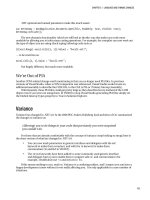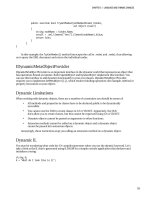Lập trình .net 4.0 và visual studio 2010 part 32 pps
Bạn đang xem bản rút gọn của tài liệu. Xem và tải ngay bản đầy đủ của tài liệu tại đây (225.97 KB, 5 trang )
CHAPTER 9 WCF DATA SERVICES
213
Hello WDS
OK, we are now ready to work with our data service.
1. Right click on MovieService.svc and select Set As Start Page.
2. Press F5 to run your application. If all is well then you will see a screen similar to Figure 9-7
showing an XML representation of our EF classes:
Figure 9-7. Output from accessing our test service
Querying WCF Data Services
WCF Data Services uses the URL to pass query parameters. For example, to retrieve the film entities, add
/Films to the end of the existing URL (for example, http://localhost/Chapter9/MovieService.svc/Films).
You should then be returned a list of all the films in AtomPub format (Figure 9-8):
CHAPTER 9 WCF DATA SERVICES
214
Figure 9-8. Returning all the films from the database
Having all the data returned at once isn’t too useful, so WDS supports a number of different query
operators that all work with the URL.
I have listed some commonly used methods in Table 9-1, but for a full list please refer to http://
msdn.microsoft.com/en-us/library/cc907912.aspx.
CHAPTER 9 WCF DATA SERVICES
215
Table 9-1. List of Common Query Operators
Action
Operator
Get film with ID 3 Films(3)
Select Film where FilmID is equal to 3 Films?$filter=FilmID%20eq%203
Get FilmName field from first FilmShowing FilmShowings(1)/Film/Title
Get film showings for first film Films(1)/FilmShowings
Display orders by order date Orders?$orderby=OrderDate
Order list of films in descending order Orders?$orderby=OrderDate%20desc
Select top two orders Orders?$top=2
Skip first orders and select next two Orders?$skip=1&top=2
When working with WCF Data Services you should note the following:
• Objects are case sensitive. Film is not the same as film (grrrrr!).
• The query needs to be URL-encoded, so spaces must be encoded as %20.
• Note the use of the ? query string character and $ to specify options.
IS THERE A WAY TO LIMIT THE AMOUNT OF RECORDS RETURNED?
Yes—when you are using WCF Data Services version 1.5. Please refer to the VS2010/.NET 4.0 changes section below.
Security in WCF Data Services
WDS allows you to fine-tune access to individual entities. For example, open MovieService.cs and find
the line that reads:
config.SetEntitySetAccessRule("*", EntitySetRights.AllRead);
This code allows read-only access to all entities (defined by the *). If you wanted to enable full
access to everything (generally a very bad idea, but useful for testing) then you can change this to:
config.SetEntitySetAccessRule("*", EntitySetRights.All);
WARNING
If you do this anyone who can access the data service will have full access.
CHAPTER 9 WCF DATA SERVICES
216
Permissions can be applied to individual objects by specifying them by name. The following line of
code will enable full access to the Film entity.
config.SetEntitySetAccessRule("Films", EntitySetRights.All);
We will need full access to the Film entity in a few minutes, so add the previous line to
MovieService.cs.
Query Interceptors
Sometimes you might want to intercept the user's query to apply additional logic to it (for example, to
filter depending on the current user). WDS allows you to do this through query interceptors.
The following example demonstrates applying this technique to any films requests to only allow
those where FilmID equals 1. Add the following code to MovieService.svc:
using System.Linq.Expressions;
[QueryInterceptor("Films")]
public Expression<Func<Film, bool>> FilterOnlyShowFilmID1()
{
return f => f.FilmID==1;
}
Returning Results in Different Formats
WDS services can return data in the following formats:
• AtomPub
• JSON
• XML
AtomPub is the default format that is returned, and from WDS 1.5 you have control over how
elements are mapped to AtomPub elements.
Let’s look at how to return results in JSON format using jQuery and then how to access an WDS
service from a console application.
Using JSON with JavaScript
JSON is a format commonly used by web applications since it is much less verbose than XML. JSON is
also understood by many JavaScript frameworks and libraries. If you want to have WCF Data Services
format your results as JSON, simply set the Accept header to application/json when making a request.
The following example shows how to use jQuery to retrieve the title of the first film in the set (for
more information on jQuery please refer to Chapter 12):
<script>
function getMovieTitle() {
$.ajax({
type: "GET",
dataType: "json",
CHAPTER 9 WCF DATA SERVICES
217
url: "MovieService.svc/Films(1)",
success: function (result) {
alert(result.d.Title);
},
error: function (error) {
alert('error ');
}
});
}
</script>
<input type="button" Value="Get Movie Title"
onclick="javascript:getMovieTitle();" />
But what JSON data will be returned by making the previous call? By using a web debugging proxy
called Fiddler (www.fiddlertool.com) you can see what is returned. The following code shows the raw
JSON:
{ "d" : {
"__metadata": {
"uri": "http://localhost/Chapter9/MovieService.svc/Films(1)", "type": "Models.Film"
}, "FilmID": 1, "Title": "Kung Fu Panda", "Description": "Classic martial arts tale",
"Length": 120, "FilmShowings": {
"__deferred": {
"uri": " http://localhost/Chapter9/MovieService.svc/Films(1)/FilmShowings"
}
}
} }
Notice how the results were wrapped by an object called d. This is to prevent Cross Site Request
Forgery (CSRF) (see Chapter 11 for more details on this).
Using JSON with C#
The following code shows how to retrieve results formatted as JSON using the HttpWebRequest class in C#:
System.Net.HttpWebRequest Request =
(System.Net.HttpWebRequest)System.Net.HttpWebRequest.Create(
"http://localhost/Chapter9/MovieService.svc/Films(1)"
);
Request.Method = "GET";
Request.Accept = "application/json";
System.Net.HttpWebResponse Response = (System.Net.HttpWebResponse)Request.GetResponse();
using (System.IO.StreamReader sr = new System.IO.StreamReader(Response.GetResponseStream()))
{
Console.WriteLine(sr.ReadToEnd());
}
Console.ReadKey();









